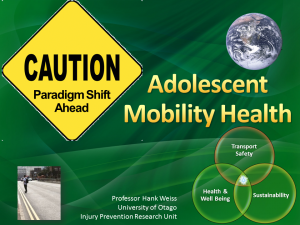 This is a multimedia presentation by Professor Hank Weiss, delivered Tuesday, October 02, 2012 at the Safety 2012 World Conference (47 min).
This is a multimedia presentation by Professor Hank Weiss, delivered Tuesday, October 02, 2012 at the Safety 2012 World Conference (47 min).
Adolescents warrant special attention. From a road safety perspective, they carry the largest crash and morbidity/mortality risk of any age group. This has led to considerable research and safety programs, but these efforts have plateaued in many countries and remain fixed within a road safety perspective. From a broader perspective, little has been done about the many non-traffic health risks related to teen driving (increased drug and alcohol use, anti-social behaviour, sexually transmitted infections, inactivity and obesity). From a sustainable transport perspective, a contemporary imperative, teens are where the transition from non-driver to driver takes place; an opportune time for interventions to minimize environmental harms.
Professor Weiss introduces a new paradigm termed ‘mobility health’ to bridge the siloed domains of safety, adolescent health and sustainable mobility. In this passionate speech to an international audience, he advocates changing the current narrow paradigm of adolescent road safety to a cross-level/cross-disciplinary, more potent, timely and healthy vision of less driving through mobility modal shift from cars to active and public transport.






 Full Correspondence:
Full Correspondence:
Comments